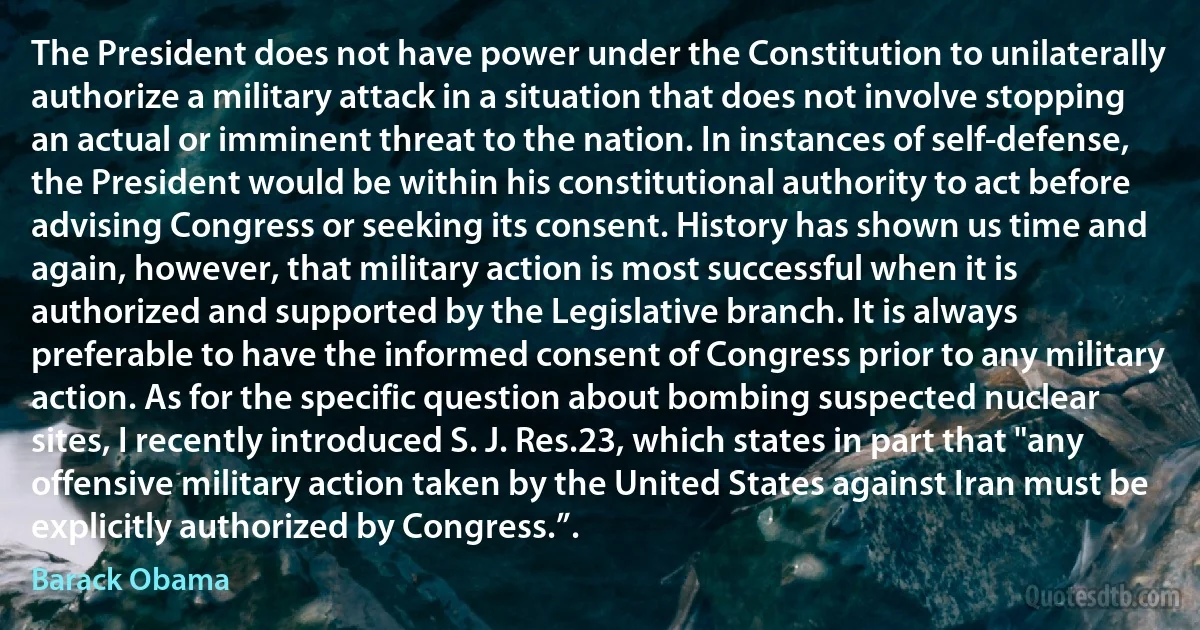
The President does not have power under the Constitution to unilaterally authorize a military attack in a situation that does not involve stopping an actual or imminent threat to the nation. In instances of self-defense, the President would be within his constitutional authority to act before advising Congress or seeking its consent. History has shown us time and again, however, that military action is most successful when it is authorized and supported by the Legislative branch. It is always preferable to have the informed consent of Congress prior to any military action. As for the specific question about bombing suspected nuclear sites, I recently introduced S. J. Res.23, which states in part that "any offensive military action taken by the United States against Iran must be explicitly authorized by Congress.”.
Barack ObamaRelated topics
act action attack authority branch congress consent constitutional history iran legislative nation nuclear power president question res seeking show situation specific take time under bombing statesRelated quotes
Because if you're not born in the United States, you cannot be president. And, there is a real question. And if this birth certificate exists, you know what I get a kick out of? The Governor of Hawaii says, "I remember when he was born 50 years ago." I doubt it. I think this guy should be investigated. I doubt it. He remembers when Obama was born? Give me a break! He's just trying to do something for his party. The fact is, if you're not born in the United States, you cannot be president. He is having a hard time - he spent millions of dollars trying to get away from this issue, millions of dollars in legal fees trying to get away from this issue. And I'll tell you what, I brought it up just routinely and all of a sudden, a lot of facts are emerging, and I'm starting to wonder myself whether or not he was born in this country.

Donald Trump
Gandhi remained committed to nonviolence; I followed the Gandhian strategy for as long as I could, but then there came a point in our struggle when the brute force of the oppressor could no longer be countered through passive resistance alone. We founded Umkhonto we Sizwe and added a military dimension to our struggle. Even then, we chose sabotage because it did not involve the loss of life, and it offered the best hope for future race relations. Militant action became part of the African agenda officially supported by the Organization of African Unity (O. A. U.) following my address to the Pan-African Freedom Movement of East and Central Africa (PAFMECA) in 1962, in which I stated, "Force is the only language the imperialists can hear, and no country became free without some sort of violence."

Nelson Mandela
It is hard to suggest a remedy for this situation, which is one no military man enjoys. One alternative would be to refuse to permit military officers to appear before Congress and leave the defense of military matters to the civilian secretaries. This is the solution followed in Great Britain and many European countries. I doubt that it will ever be accepted in the United States, where the COngress wants to hear the facts from military men who presumably are without political motivation. A second alternative would be to take the position that the advice of the Chiefs of Staff to their civilian superiors is privileged and not to be revealed under Congressional interrogation. Thus far the Executive authority has not seen fit to raise the storm such a stand would create.

Maxwell D. Taylor
For The United States, the leading space faring nation for nearly half a century, to be without carriage to low Earth orbit and with no human exploration capability to go beyond Earth orbit for an indeterminate time into the future, destines our nation to become one of second or even third rate stature. While the President's plan envisages humans traveling away from Earth and perhaps toward Mars at some time in the future, the lack of developed rockets and spacecraft will assure that ability will not be available for many years.
Without the skill and experience that actual spacecraft operation provides, the USA is far too likely to be on a long downhill slide to mediocrity. America must decide if it wishes to remain a leader in space. If it does, we should institute a program which will give us the very best chance of achieving that goal.

Neil Armstrong
[The Kellog Pact is] a mighty moral bulwark against war - and we must never underestimate the effectiveness of moral bulwarks with no bayonet nor bludgeon behind them. The entry of the United States into the Permanent Court of International Justice, the growing confidence in the court, and the increase in the number of nations who have signed the Optional Clause mark definite and, I believe, irrevocable steps in the displacement of military power by judicial process in the settlement of international disputes. Public servants like us will fail in our duty if we do not diminish military power in proportion to the increase of political security...I dare affirm that, in the naval programme of the leading naval powers, there is a margin between real security needs and actual or projected strength, and the world expects this Conference to eliminate that margin.

Ramsay MacDonald
